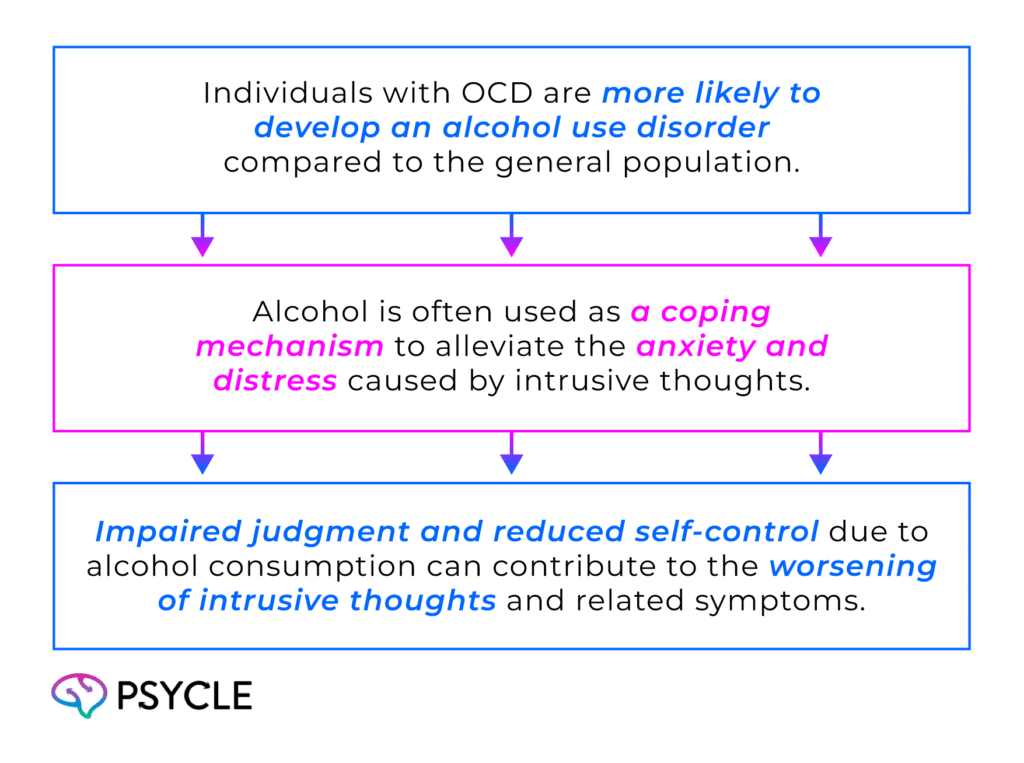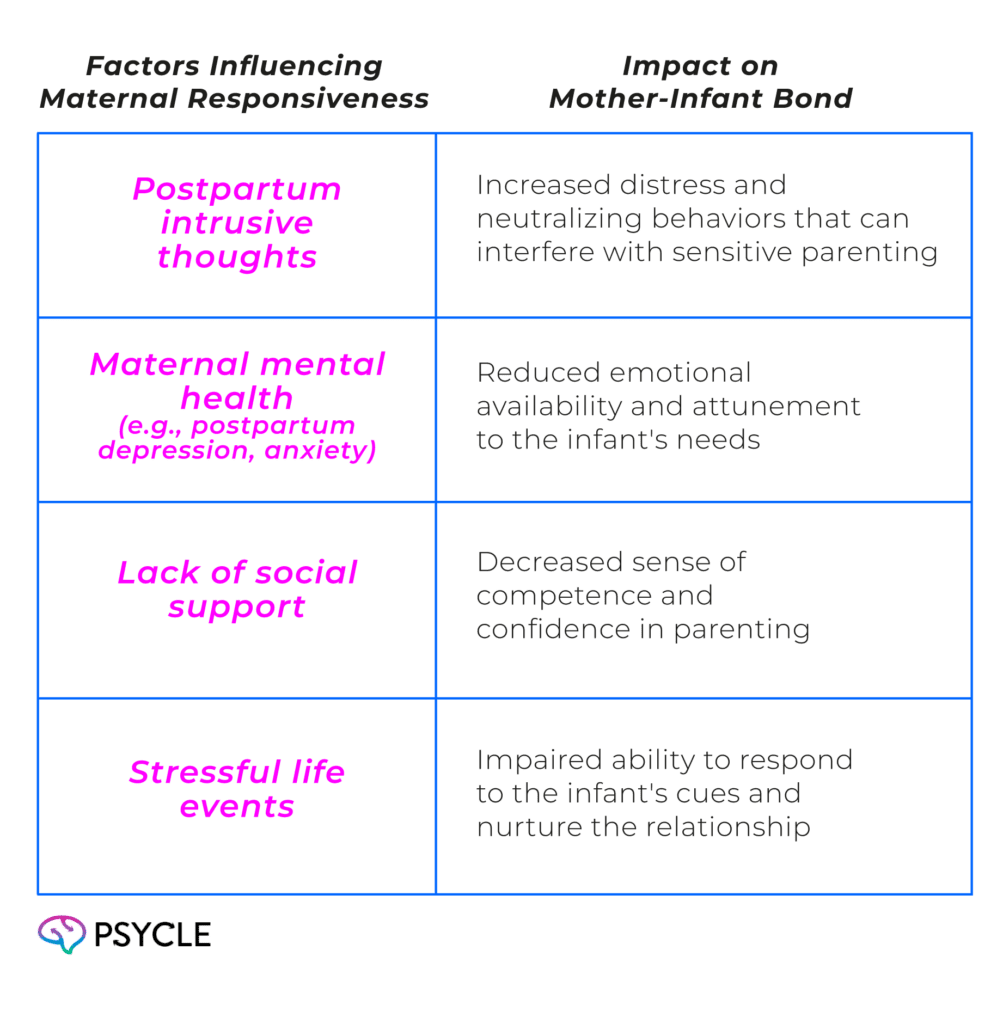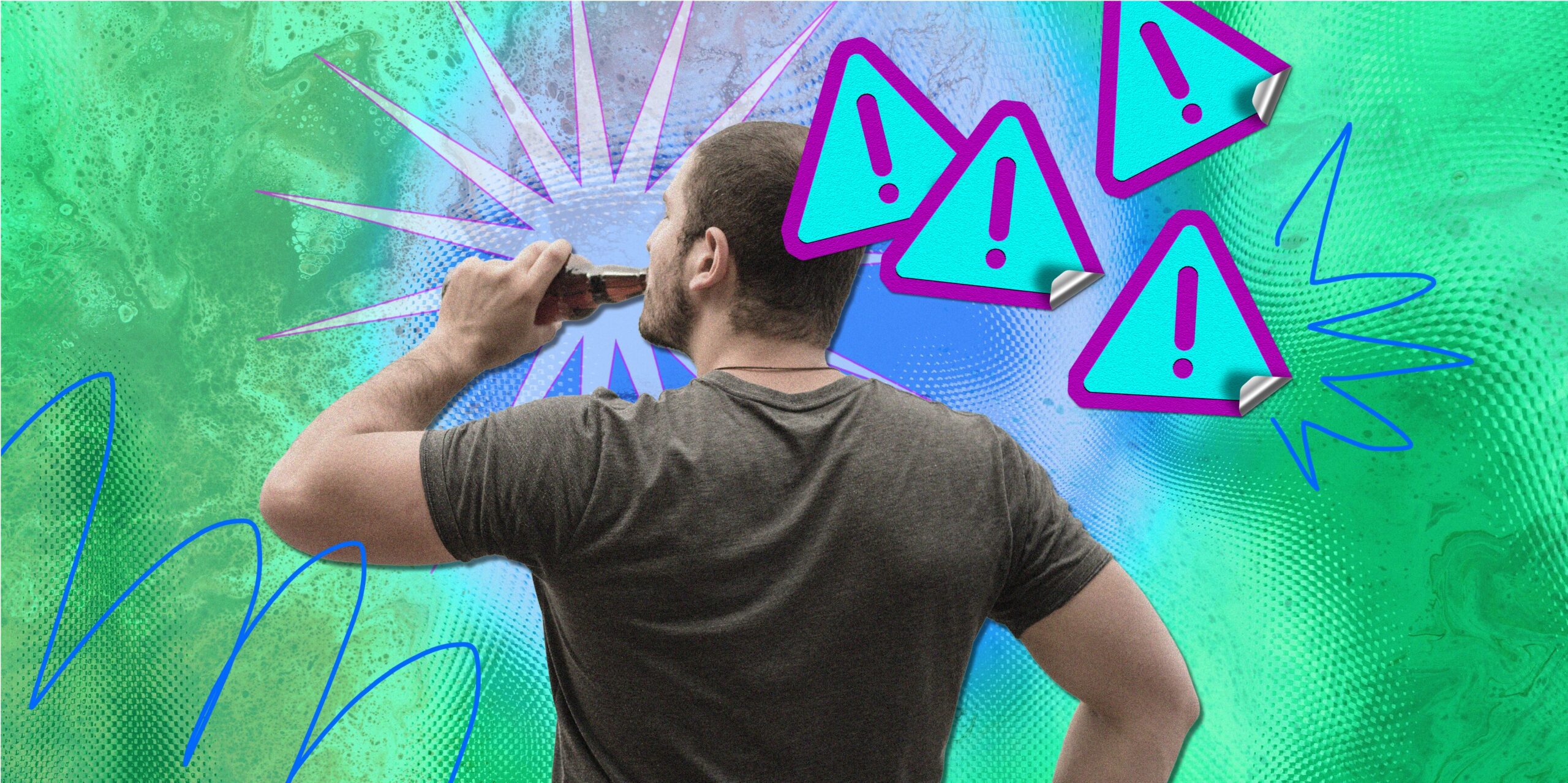Intrusive thoughts are unwanted, persistent mental images or ideas that can cause significant distress and anxiety. Unfortunately, alcohol consumption, which is often used as a coping mechanism, can exacerbate these intrusive thoughts and lead to further mental health challenges.
Understanding the complex relationship between alcohol, obsessive-compulsive disorder (OCD), and intrusive thoughts is crucial for improving overall well-being.
Individuals with OCD often have a higher prevalence of co-occurring alcohol use disorder (AUD) compared to the general population. This comorbidity can be attributed to the fact that alcohol is frequently used as a means to alleviate the anxiety and discomfort associated with intrusive thoughts and obsessive-compulsive symptoms.
However, while alcohol may provide temporary relief, it ultimately impairs the brain’s ability to manage stress and anxiety, potentially exacerbating the very issues it was intended to address.
Key Takeaways
- Intrusive thoughts are unwanted, persistent thoughts that can cause significant distress and anxiety.
- Alcohol consumption can lead to impaired judgment and reduced self-control, potentially worsening intrusive thoughts and related symptoms.
- Individuals with obsessive-compulsive symptoms have a higher rate of co-occurring alcohol use disorder compared to the general population.
- Alcohol is often used as a coping mechanism to alleviate anxiety and distress associated with intrusive thoughts.
- While alcohol may provide temporary relief, it can ultimately impair the brain’s ability to manage stress and anxiety and potentially exacerbate obsessive-compulsive symptoms in the long run.
Introduction to Intrusive Thoughts and Alcohol Consumption
Intrusive thoughts often seem to come out of nowhere and can be difficult to control or ignore. Interestingly, alcohol consumption can play a role in exacerbating intrusive thoughts and related symptoms.
When individuals consume alcohol, their judgment and self-control can become impaired. This can lead to a heightened susceptibility to intrusive thoughts, as the brain’s ability to regulate these unwanted thoughts is compromised. Additionally, alcohol is often used as a coping mechanism by individuals struggling with obsessive-compulsive disorder (OCD) or other mental health conditions characterized by intrusive thoughts.
The Link Between Intrusive Thoughts and Alcohol Use Disorder
Studies have found that individuals with obsessive-compulsive symptoms have a higher rate of co-occurring alcohol use disorder compared to the general population. This suggests that alcohol may be used as a way to temporarily alleviate the anxiety and distress associated with intrusive thoughts.
However, this coping mechanism can ultimately lead to further exacerbation of symptoms and the development of problematic drinking patterns.

Understanding the complex relationship between intrusive thoughts and alcohol consumption is crucial for developing effective treatment strategies and improving the well-being of individuals struggling with these challenges.
Does Alcohol Make Intrusive Thoughts Worse?
For those dealing with intrusive thoughts and obsessive-compulsive symptoms, turning to alcohol might seem like a good idea. But, it can lead to serious problems in the long run.
Alcohol acts as a depressant in the brain. It changes how we feel emotions and can make it tough to ignore unwanted thoughts. This can make anxiety and depression worse.
Also, alcohol messes with how we handle stress and emotions. This can start a cycle where people use alcohol to deal with thoughts, but it makes things worse.
While alcohol might seem like a quick fix, it’s important to tackle the real issues. Using proven treatments and healthy ways to cope can help. This approach can improve mental health and break the cycle of using alcohol to deal with problems.
Comorbidity of Obsessive-Compulsive Disorder and Alcohol Use Disorder
The link between obsessive-compulsive disorder (OCD) and alcohol use disorder (AUD) is complex. Alcohol might seem to help at first. But it can make things worse, creating a cycle of OCD and AUD.
Shared Neurological Substrates and Deficits
Obsessive-compulsive disorder (OCD) and alcohol use disorders (AUD) have more in common than you might think.
Both OCD and AUD show similar problems with executive functioning. This includes planning, decision-making, and controlling impulses. People with these conditions often find it hard to manage their thoughts and are more likely to turn to alcohol as a way to cope.
Stress is another common factor between OCD and AUD. High stress can change the brain, affecting how we handle emotions and make decisions. These changes might help explain why both OCD and stress are linked to alcohol use.
By looking into the shared brain issues, executive function problems, and stress, we can find better ways to help. This knowledge can lead to more effective treatments for OCD and AUD. It aims to improve the lives of those struggling with these conditions.
The Role of Anxiety and Depression
Intrusive thoughts are a big problem in obsessive-compulsive disorder (OCD). But, anxiety and depression are also big issues in both OCD and alcohol use disorder (AUD) groups. These mental health problems might make people more likely to use alcohol to cope with their thoughts and OCD symptoms.
In people with OCD, major depression, social anxiety, generalized anxiety, and specific phobias are common. These conditions have shown links to alcohol abuse. This shows how complex the relationship is between intrusive thoughts, anxiety, depression, and drinking problems.
It’s key to tackle the anxiety and depression that often go with OCD and AUD. By understanding these conditions, doctors can create better treatment plans. This helps those dealing with intrusive thoughts, alcohol use, and mental health issues.
Impact on Symptom Severity and Treatment Outcomes
A study in the Journal of Anxiety Disorders found that OCD with AUD is more severe. People with both disorders have more intrusive thoughts and compulsions. They also face more anxiety and depression, making treatment harder.
Enhanced Suicidality and Poorer Outcomes
Having AUD with OCD increases the risk of suicide, according to a study in the journal Brief Treatment and Crisis InterventionTreatment for OCD is less effective when AUD is present. This leads to more relapses. Specialized care is needed to handle both disorders together.
In summary, OCD and AUD together worsen symptoms and treatment success. It’s vital to tackle both disorders to improve well-being and outcomes.
Postpartum Intrusive Thoughts and Maternal Responsiveness
After childbirth, many new mothers face a unique challenge – intrusive thoughts about harming their infants. These thoughts can be very distressing. They might lead to behaviors like excessive checking or avoiding the baby. Unfortunately, these actions can make it harder for a mother to respond sensitively to her child.
These thoughts can cause a lot of pain for mothers who think they are true. Trying to reduce this pain can make it harder for a mother to meet her baby’s needs. This is a big concern for the wellbeing of both the mother and the child.

It’s very important to address the impact of intrusive thoughts on a mother’s ability to respond to her baby. By providing the right help and resources, we can support new mothers. This way, we can help them build strong, healthy bonds with their children.
Alcohol and Cognitive Processes in Depression
Drinking doesn’t change how individuals with depression think or feel. It also doesn’t affect their symptoms or how their body reacts.
This means that while some people might use alcohol to cope with depression, it doesn’t change their thinking patterns. The relationship between alcohol, cognitive processes, depression, rumination, and metacognition is more complex than we thought.
This highlights the need to tackle depression’s root causes, not just use alcohol as a quick fix. Effective treatments include therapy, lifestyle changes, and sometimes medication.
Self-Medication Hypothesis and Coping Strategies
The self-medication hypothesis says people might use alcohol to deal with bad feelings and thoughts, like intrusive thoughts. This can lead to problematic drinking patterns.
Negative thoughts about one’s own thoughts can lead to using alcohol to control or avoid these thoughts. But, this can make these negative thoughts worse over time, creating a cycle.
To manage intrusive thoughts and alcohol use, it’s important to tackle underlying mental health issues. Developing healthy coping strategies and getting professional help are key. This can help break the cycle of self-medication and improve long-term well-being.
Reducing Intrusive Thoughts and Alcohol Consumption
It’s important to find effective treatments for those dealing with intrusive thoughts and alcohol use disorder.
One important step is to find the root causes. This might mean dealing with conditions like OCD or anxiety. Therapy, medication, or a mix of both can help control thoughts and reduce the urge to drink.
Seeking Professional Support
For those with both intrusive thoughts and alcohol use disorder, getting professional help is vital. Mental health experts can offer treatments like Cognitive Behavioral Therapy (CBT) or Exposure and Response Prevention (ERP) therapy. These help overcome intrusive thoughts and teach better coping skills.
Addiction treatment programs that cover both mental health and substance use are also beneficial. These programs use a holistic approach, including individual therapy, group counseling, and teaching relapse prevention skills.
By tackling intrusive thoughts and alcohol use disorder with a comprehensive plan, individuals can make significant improvements in their mental health and overall well-being.
Developing Healthy Coping Strategies
Along with professional help, learning healthy ways to cope is crucial. Some good strategies include:
- Mindfulness practices like meditation or deep breathing to manage anxiety.
- Physical activity or exercise to regulate mood and relieve stress.
- Cognitive-behavioral techniques to change negative thoughts into positive ones.
- Support from friends, family, or groups for a sense of community and accountability.
By focusing on these coping strategies, people can handle intrusive thoughts without alcohol.
Conclusion
Alcohol might seem to help alleviate intrusive thoughts by easing anxiety and distress. But, it actually hinders the brain’s ability to handle these thoughts.
People with OCD and AUD often deal with anxiety and depression too. These conditions make it harder to stop using alcohol as a way to cope. The brain’s similarities in OCD and alcohol use disorders also play a role.
To get out of this cycle, treatments focus on the mental health issues. They help find better ways to cope and offer professional help. By tackling the root causes, people can manage their symptoms better and feel better overall.
FAQs
What is the Relationship Between Intrusive Thoughts and Alcohol Consumption?
Intrusive thoughts are unwanted, persistent thoughts that cause distress and anxiety. Drinking alcohol can make judgment worse and reduce self-control. This can make intrusive thoughts and related symptoms worse.
Do Individuals with Obsessive-Compulsive Symptoms Have a Higher Rate of Co-Occurring Alcohol Use Disorder?
Yes, people with obsessive-compulsive symptoms are more likely to have alcohol use disorder. They often drink to ease anxiety and distress from intrusive thoughts.
What are the Shared Neurological and Cognitive Deficits Between Obsessive-Compulsive Disorder (OCD) and Alcohol Use Disorders (AUD)?
OCD and AUD share brain issues, problems with executive functions, and high stress levels. These factors may link intrusive thoughts and alcohol use.
How Do Anxiety and Depression Impact the Relationship Between Intrusive Thoughts and Alcohol Use?
Anxiety and depression are common in both OCD and AUD. These conditions make people more likely to use alcohol to cope with intrusive thoughts and symptoms.
Source Links
- https://www.ncbi.nlm.nih.gov/pmc/articles/PMC8887883/
- https://www.ncbi.nlm.nih.gov/pmc/articles/PMC9881120/
- https://www.ncbi.nlm.nih.gov/pmc/articles/PMC7031018/
- https://www.tandfonline.com/doi/abs/10.1080/16066359.2022.2140145
- https://www.researchgate.net/profile/Kenneth-Yeager/publication/247903631_Obsessive-Compulsive_Disorder_Comorbid_Depression_Substance_Abuse_and_Suicide_Attempts_Clinical_Presentations_Assessments_and_Treatment/links/5810fe7d08aee15d491500f8/Obsessive-Compulsive-Disorder-Comorbid-Depression-Substance-Abuse-and-Suicide-Attempts-Clinical-Presentations-Assessments-and-Treatment.pdf
- https://www.ncbi.nlm.nih.gov/pmc/articles/PMC8887883/

